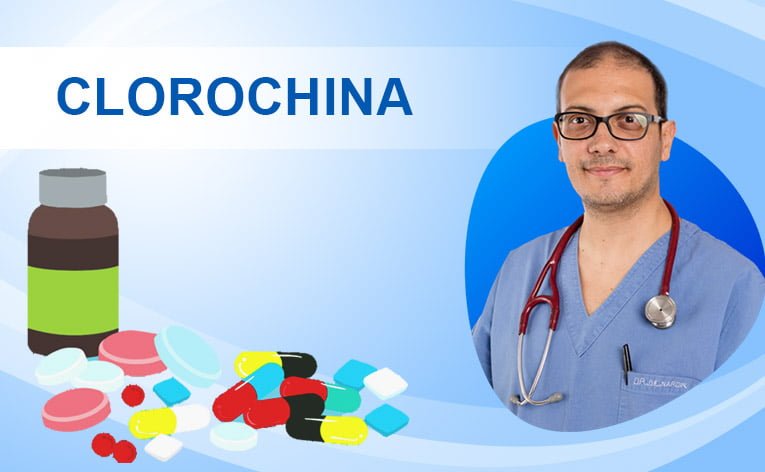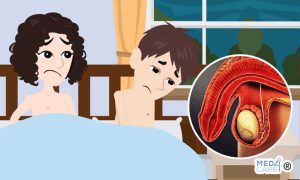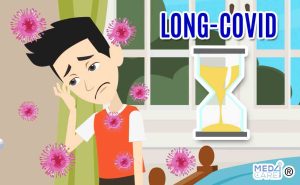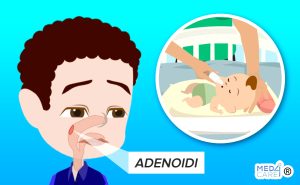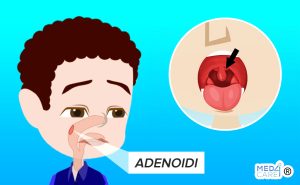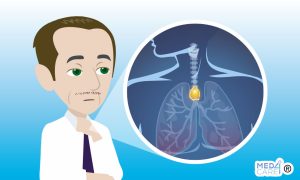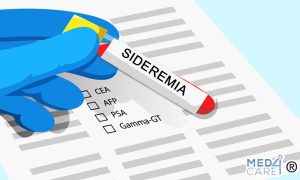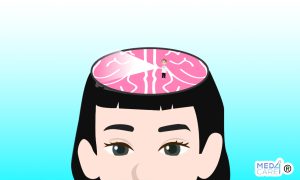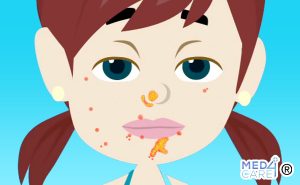Dopo le ipotesi, un primo studio pilota caso-controllo
Come abbiamo già accennato nel nostro precedente articolo sulla clorochina, è stata dimostrata l’efficienza di azione su alcuni virus e tra questi è incluso il coronavirus umano responsabile della SARS. Ciò che ha destato l’attenzione è il fatto che l’attuale coronavirus, come già esposto nel nostro articolo, è molto simile al coronavirus della SARS. Questo nuovo studio, condotto in Cina nella provincia di Hubei, comincia a dare delle risposte in merito alla reale efficacia del farmaco.
Com’è stato condotto l’esperimento
Tra il 4 ed il 28 febbraio 2020 sono stati coinvolti 62 soggetti positivi al covid-19, ricoverati all’ospedale dell’Università di Wuhan.
I partecipanti sono stati equamente divisi in due gruppi:
- Gruppo di controllo: trattato con una soluzione placebo, che non ha attività farmacologica;
- Gruppo di trattamento: somministrazione di idrossiclorochina, nelle quantità di 400 mg al giorno, per cinque giorni.
Al termine dei cinque giorni sono state effettuate le analisi volte a verificare l’effettiva efficacia del farmaco:
- radiografia toracica,
- misurazione febbre,
- sintomi polmonari.
Mettendo a confronto i due gruppi, è stato possibile rilevare le differenze tra i pazienti sottoposti a somministrazione di idrossiclorochina e quelli trattati con placebo.
Risultati
I dati ottenuti dall’esperimento sono incoraggianti e positivi. Infatti, al termine dei cinque giorni di trattamento con idrossiclorochina, i sintomi della malattia sono risultati significativamente alleviati, e le differenze tra i due gruppi sembrano suggerire che l’idrossiclorochina aumenta le possibilità di guarire più velocemente dalla malattia. Nello specifico, in questi pazienti è stata osservata una diminuzione dei tempi di recupero per i sintomi di tosse e febbre! Allo stesso tempo, un’alta percentuale di infetti ha parzialmente ridotto l’infiammazione polmonare, dando prova delle proprietà antinfiammatorie del farmaco.
- Il gruppo di controllo registra un miglioramento della polmonite nel 55% dei casi. Si segnala che quattro soggetti hanno avuto una progressione grave della malattia;
- Il gruppo di trattamento, a seguito di assunzione di idrossiclorochina, lo registra nell’81% dei casi. Due pazienti hanno manifestato lievi reazioni avverse al principio attivo.
Dati
I dati in tabella mostrano la minore durata di sintomi quali febbre e tosse nei pazienti trattati con idrossiclorochina rispetto al gruppo di controllo.
Altro dato importante è dato dai quattro soggetti che hanno vissuto una progressione della malattia, che si è trasformata in una forma severa: nessuno di questi faceva parte del gruppo di trattamento.
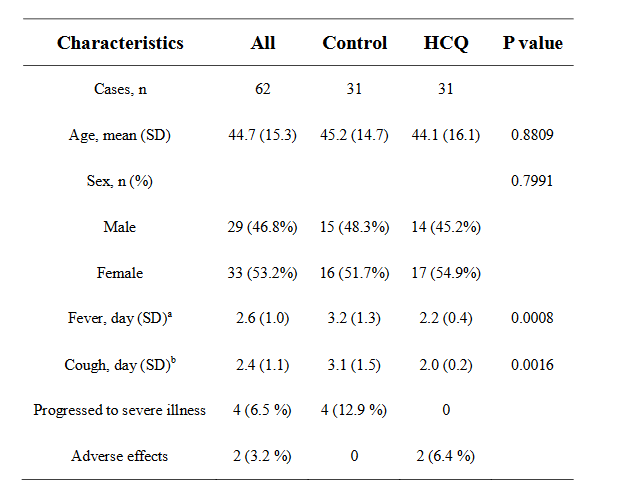
In conclusione
Nonostante il ristretto numero di casi, il potenziale della clorochina nel trattamento di COVID-19 è stato parzialmente confermato. Considerando che al momento non esiste un’opzione migliore, con una gestione accurata ed attenta, questa pratica si può rivelare davvero promettente. Naturalmente, sono ancora necessarie ulteriori ricerche cliniche e di base su larga scala per chiarirne il meccanismo specifico e ottimizzare continuamente il trattamento. Per quanto riguarda gli effetti collaterali, invece, poter decidere e pianificare attentamente i singoli piani di trattamento può rivelarsi un metodo relativamente sicuro. Attraverso il monitoraggio tempestivo delle reazioni avverse, si potrebbe evitare il sovradosaggio applicando piccole dosi del farmaco.

Dott. Marco De Nardin
Bibliografia:
- Efficacy of hydroxychloroquine in patients with COVID-19: results of a randomized clinical trial Zhaowei Chen, Jijia Hu, Zongwei Zhang, Shan Jiang, Shoumeng Han, Dandan Yan, Ruhong Zhuang, Ben Hu, Zhang Zhang;
- Schrezenmeier E, Dorner T. Mechanisms of action of hydroxychloroquine and chloroquine: implications for rheumatology. Nat Rev Rheumatol. 2020. DOI: 10.1038/s41584-020-0372-x.
- Wang M, Cao R, Zhang L, et al. Remdesivir and chloroquine effectively inhibit the recently emerged novel coronavirus (2019-nCoV) in vitro. Cell Res. 2020. DOI: 10.1038/s41422-020-0282-0.
- Gao, Z. Tian, X. Yang. Breakthrough: chloroquine phosphate has shown apparent efficacy in treatment of COVID-19 associated pneumonia in clinical studies. Biosci Trends (2020 Feb 19), 10.5582/bst.2020.01047. DOI: 10.5582/bst.2020.01047.
- Colson P, Rolain JM, Lagier JC, Brouqui P, Raoult D. Chloroquine and hydroxychloroquine as available weapons to fight COVID-19 [published online ahead of print, 2020 Mar 4]. Int J Antimicrob Agents. 2020;105932. DOI: 10.1016/j.ijantimicag.2020.105932.
- Akpovwa H. Chloroquine could be used for the treatment of filoviral infections and other viral infections that emerge or emerged from viruses requiring an acidic pH for infectivity. Cell Biochem Funct. 2016;34(4):191–196. DOI:10.1002/cbf.3182.
- Keyaerts, L. Vijgen, P. Maes, J. Neyts, M.V. Ranst. In vitro inhibition of severe acute respiratory syndrome coronavirus by chloroquine. Biochem. Biophys. Res. Commun., 323 (2004), pp. 264-268.DOI: 10.1016/j.bbrc.2004.08.085.
- Vincent, M.J., Bergeron, E., Benjannet, S. et al. Chloroquine is a potent inhibitor of SARS coronavirus infection and spread. Virol J 2, 69 (2005). DOI: 10.1186/1743-422X-2-69.
- Proano Cinthia., Kimball Glenn P. Hydroxychloroquine Retinal Toxicity. N. Engl. J. Med., 380(17), e27. DOI:10.1056/NEJMicm1304542.
- Radke JB, Kingery JM, Maakestad J, Krasowski MD. Diagnostic pitfalls and laboratory test interference after hydroxychloroquine intoxication: A case report. Toxicol Rep. 2019;6:1040–1046. Published 2019 Oct 7. DOI: 10.1016/j.toxrep.2019.10.006.

